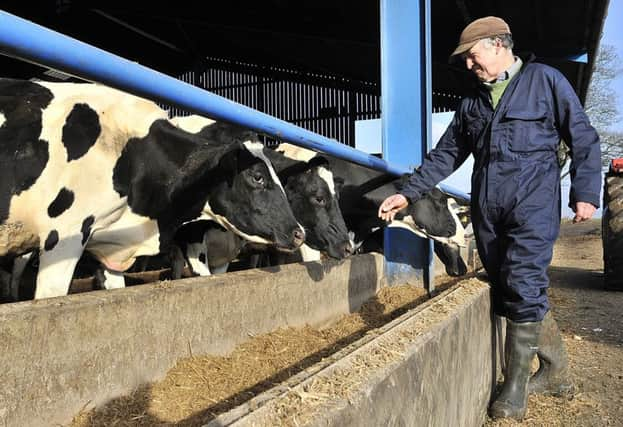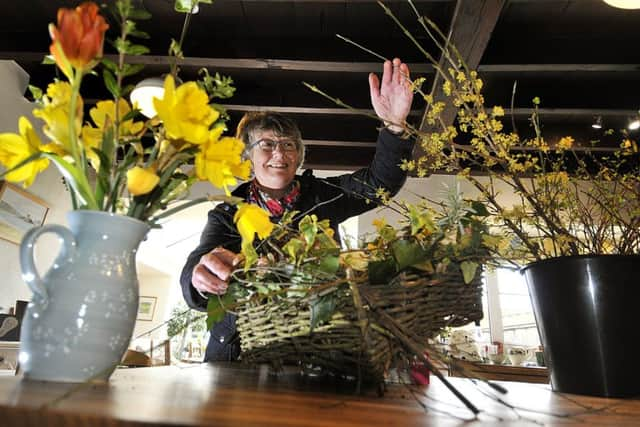Farm of the Week: Dairy woe likely to increase focus on growing


While father and son Steve and Richard manfully tend the other 499-and-a-half acres growing wheat, barley, beans, maize, rye and grass while milking a 140-cow dairy herd and running a beef operation, Steve’s wife Jill is putting a smile on hundreds of faces at weddings, special celebrations and Wykeham Village Market with flowers from her comparatively tiny acreage.
Jill is one of many country ladies who have realised the benefits of flower farming. In Jill’s case it is providing income, she’s selling a product in demand, her skillset is enhanced and job satisfaction has never been better.
Advertisement
Hide AdAdvertisement
Hide Ad“My father grew flowers commercially, so I had some background to call upon when starting Binnington Blooms but it was listening to Gill Hodgson who set up the Flowers From The Farm organisation that inspired me.


“I’ve always been a gardener and had a really pretty garden I’d spent years making attractive but when Gill spoke to our local farm women’s group and told of her ideas about getting others to do the same by growing British flowers I was inspired. I came home and dug it all up. From then on if I couldn’t cut it, I didn’t grow it.
“I had flowers all around the house seeing which would cut and last. By the following year, 2013, I’d started selling bunches through local shops and in 2014 Steve gave me a sheltered strip of field with a hedge behind it to the north. Richard came with his vintage tractor and plough and my half an acre of flowers was born.
“Everything I have is grown outside. I have no polytunnels or greenhouses. My flowers are all hardy. I start with daffodils in mid-March and my season goes right through to mid-October. It’s not about throwing a packet of seeds down and seeing what happens. I grow beautiful daffodils including doubles, whites and lovely smelling narcissus. Tulips are next, followed by biennials such as Hesperus, lots of Sweet Williams, on to Alliums, delphiniums and many more. I grow over 40 flower varieties.”
Jill has learned valuable lessons since turning commercial.
Advertisement
Hide AdAdvertisement
Hide Ad

“The biggest skill I have developed is picking flowers at the right time, getting the cut flower straight into water and removing excess leaves so the water hasn’t to fill lots of stems. Customers are always surprised at how long my flowers last. Picked at the right time and cared for they will last a week to ten days. That’s what British flowers are all about. It’s a key thing. They haven’t travelled across the world spending days getting to you, they are picked and bought fresh.”
Last year Jill picked in excess of 20,000 stems. In the past three years her business has gone from supplying shops to weekly attendance at Wykeham Village Market and a strong business relationship with florist Jo Purdy who has a studio in Wykeham and who was with Jill earlier this week when I visited.
“What Jill is doing is well matched to my business,” says Jo. “I would buy her flowers all year round if I could. We’ve set up a buckets and bouquets enterprise this year specifically for weddings. Locally grown flowers for funerals are also proving popular and the cottage style, quintessentially English just picked from the garden look is very much in demand.”
Two-and-a-half years of poor milk prices and a consideration of what Richard wants to do in the future have brought about the talk of new directions. The Smiths are clearly not about to stand still.
Advertisement
Hide AdAdvertisement
Hide AdSteve’s parents Bob and Joyce moved to West Binnington as tenants to the Ganton Estate in 1947. The family purchased the farm’s 350 acres in 2004 and rent a further 150 acres. The land ranges from 15ft above sea level to 350ft and includes heavy clay, sandy land and Wold-type.
They are growing 140 acres of winter wheat this year using the varieties JB Diego and Evolution that they hope to get away on a biscuit contract. Yield is usually between 3-3.5 tonnes per acre. Other crops are spring barley, winter barley, spring beans and maize. All except the wheat is incorporated as cattle feed for the dairy and beef herds.
“We added beans to cut feed costs and also grow rye grass,” says Steve. “We have 140 dairy cows and with followers our stock runs to 200. We also have 200 homebred beef animals. We take the males through to bulls at 16-18 months and heifers to 30 months selling everything live at Malton market.
“It’s not been easy recently but you have to cut your cloth accordingly. We used to have two men on the farm, we now have just one and we’ve adopted zero grazing whereby we cut all the grass and bring it to the cows. They still go out in summer but we have reduced some input costs as a result of being able to grow rye in the winter months as it grows at a lower temperature than grass and our sandy land is good for it.”
Nonetheless the dairy herd looks likely go at some stage.
Advertisement
Hide AdAdvertisement
Hide Ad“The milk price from Chestnut Dairies who we supply should be just over 26ppl this month but it needs to be over 27ppl to allow for reinvestment and I’m not convinced it will stay up. That’s not Chestnut’s fault. We have a good relationship with them. Dairying has been the driver here for the past 30 years but price reliability isn’t as good as it was and that means we need to do what Richard wants now. We used to grow potatoes. We will probably go back to them as well as the cereals and beef.”
Richard’s favourite role is ploughman. He competes at YFC ploughing matches with his Ferguson 165 he inherited from his grandfather, Jill’s father and three-furrow Kverneland plough.
“I do prefer arable over dairy but I really enjoy stock as well and I’d like to see us develop the beef side. I also work on a potato farm on the Wolds when we’re sorted here.”